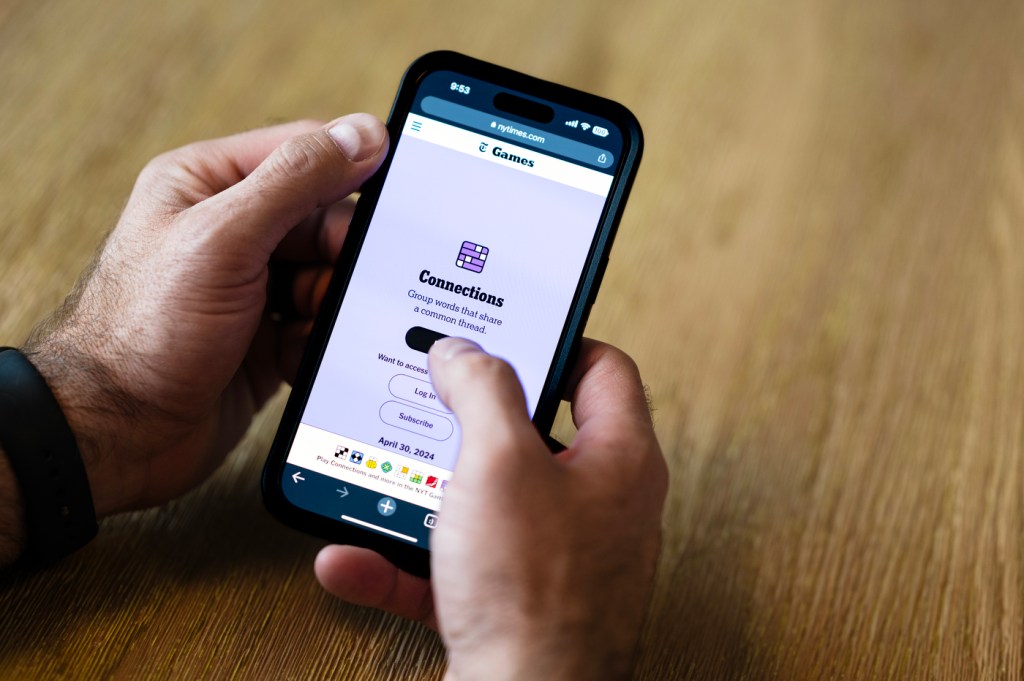Connections and Wordle games from the New York Times are wildly popular. Can they improve cognitive function as you age?
They prompt people to think in new ways, but they’re not necessarily improving people’s brain health, says Susanne Jaeggi, a professor with the Center for Cognitive and Brain Health at Northeastern University.

Every day, millions of people across the globe fill their morning commute or lunch break with New York Times games such as Wordle or Connections.
The Times offers a slew of popular games from its daily crossword to “Spelling Bee,” a daily game that challenges users to come up with as many words as possible using a given set of letters.
Among the most popular games are Wordle, which the company acquired in 2022 and requires players to guess a different five-letter word each day, and Connections, which the Times launched in 2023. The latter presents the player with 16 words and has them place them into four groups, guessing the connection between them.
The Times said in 2023, there were 4.8 billion plays of Wordle, 2.3 billion plays of Connections, and 8 billion puzzle and game plays overall. People love these games because they’re not only fun, but challenging. But as much as they prompt people to think in new ways, they’re not necessarily improving people’s brain health, said Susanne Jaeggi, a professor with the Center for Cognitive and Brain Health at Northeastern University.
“As always in science, (the answer is) not that simple,” Jaeggi said. “There are a lot of different things that contribute to our brain health. … As long as you’re doing something that keeps your brain engaged and fit, that could potentially be helpful to prevent age-related cognitive decline. Whether it’s exactly these games, that’s an open question, because a lot of these are new and there’s not a lot of (research) out there.”

As people age, certain cognitive functions decline, Jaeggi said. These tend to be more “fluid functions” like problem-solving, processing speed and, most notably, working memory. Some of the popular New York Times games tap into these functions, which is why people often perceive them as combating age-related cognitive decline.
There are things people can do to help prevent this decline even before it begins, said Art Kramer, psychology professor and director for the Center for Cognitive and Brain Health. Research shows that eating a healthy diet, being physically active, reducing stress, getting enough sleep and having frequent social interaction can all reduce the risk of cognitive decline as one ages.
Intellectual engagement helps as well. People with higher levels of education or complex, information-heavy jobs tend to have better brain health, showing that certain cognitive-based activities can help with cognition as we age, Jaeggi said.
Featured Posts
But research shows that games like crossword puzzles aren’t necessarily building on the areas where people see age-related decline, Kramer said.
“If you did crossword puzzles your whole life and you enjoyed them, that’s great,” Kramer said. “But they’re likely not going to improve cognition.”
Games like crossword puzzles involve recalling existing information. This is an area that does not decline with age, Jaeggi said.
While research hasn’t been done specifically on the Times’ popular games, Jaeggi said they’re similar to crosswords because they involve recalling knowledge a person already has, albeit in a different way.
“All your knowledge that you accumulate as a result of expertise and education, these are skills that remain as we age,” Jaeggi said. “Things like crossword puzzles that have you retrieve this accumulated knowledge, that’s not typically something that declines with age.”
That doesn’t mean these games are totally useless. Besides just being fun, games like Wordle engage the brain’s executive functions and help teach the brain to resist distractions, Jaeggi said.
“Your whole lifestyle would help maintain cognitive health as you age,” Jaeggi said. “It’s important to note that these games have not been designed for this. They’re designed to be entertaining and people like them, and they should play them just for their entertainment value. But there’s nothing wrong with this.”
There are other activities that can be beneficial for the brain. Jaeggi said anything that is “challenging” can be beneficial for your cognition. What that is depends on the person.
Kramer said research has also shown that learning a new language or learning to play an unfamiliar instrument can be helpful for cognitive and brain health.
“What seems to be the case is that if you learn new skills and they’re challenging at whatever level of challenge is appropriate for you, then you see benefits,” Kramer added. “So if you’ve never done crossword puzzles or you’ve never played (Sudoku), that might be of benefit to you.”











